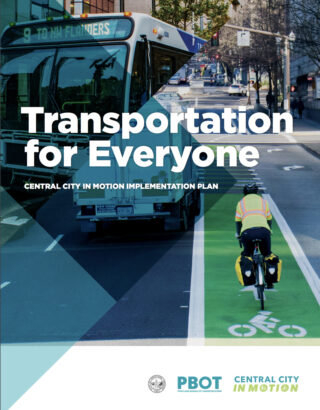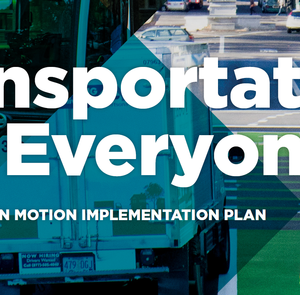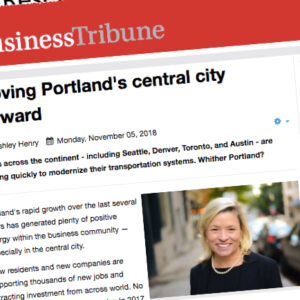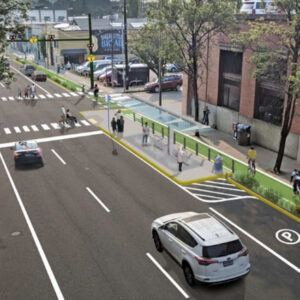
City Council will get its first chance to debate the Central City in Motion plan this Thursday.
The Portland Bureau of Transportation (PBOT) hopes commissioners will approve their list of 18 projects they say will vastly increase capacity of streets from the Pearl to the Lloyd, and from southwest to the central eastside. PBOT’s argument is that growth of our central city makes squeezing more efficiency out of our existing roads imperative — and we can only do that by making cycling and transit easier and faster.
But if this plan is to get through council it will need support from local transportation advocacy groups. Three in particular have watched this plan closely as it has taken shape over the past several years: Bike Loud PDX, The Street Trust, and Portlanders for Parking Reform.
Below is a taste of the tone you can expect from each group on Thursday…
Bike Loud PDX
In some ways the CCIM plan will be a coming-of-age for Bike Loud. The group has given PBOT extensive feedback on the project, culminating in a 20-page letter sent to the agency in September and an update on the plan from PBOT Project Manager Gabe Graff at the group’s monthly meeting last week.
Here’s the testimony Bike Loud will share Thursday:
We strongly support the Central City in Motion (CCIM) Plan and urge Council to adopt it. For too many years, Portlanders have seen the cities around them initiate bold plans for improving walking, biking and public transit systems, while we rest on our accomplishments from previous decades. Our bicycle mode share is stuck at 6%, the same as it was in 2011, and our transit ridership continues to fall. Our policies and plans are still visionary, but we have not matched our words with action. Now, we have a chance to change that.
The CCIM plan alone will not solve these issues, but it is a strong step forward towards the city we want to live in: one that acts decisively in the face of climate change, that has clean air and safe streets in all neighborhoods, and moves people efficiently to, from, and around the central city. PBOT’s estimates show that with this plan the number of people walking, biking, or taking transit in the Central City will increase from 40% today to 60% by 2035, which would make substantial progress towards 85% goal set in the 2035 Transportation System Plan.
The world of transportation is changing quickly. The PBOT e-scooter pilot project has led to over 640,000 trips in just four months. When BIKETOWN and PBOT made our bikeshare system dockless and free in May 2018, riders traveled 162,252 miles – more than doubling usage from May 2017. These recent examples prove that the pent-up demand for safe and efficient transportation alternatives means bold actions by the City can lead to meaningful and immediate positive results. Making better roadways for these small light individual transport (LIT) devices, and the ones coming in the future is of the utmost urgency. We support the recommendation by the Bicycle Advisory Committee that all 18 projects be completed within the five year timeline.
During the implementation phase, we feel the best approach is to put these designs on our streets as quickly as possible with temporary measures so residents and businesses alike can experience the benefits of these spaces. We recommend a one year timeline for this action. By using temporary strategies, not only will the network be usable very soon by Portlanders, but PBOT will be able to make adjustments and trial these new designs in real time before committing them to permanent concrete. We look forward to working with staff at PBOT on the details for each of these projects.
You have the opportunity today to show your unanimous support for Portland values. Voting for Central City in Motion is a vote for climate action, for safer streets, for less pollution. Today we can begin a new era of Portland leadership on efficient, green transportation.
Advertisement
The Street Trust
The Street Trust is also a huge fan of the projects outlined in the plan. In part, they say, because, “people will love them.” The Street Trust detailed other reasons in a letter by Executive Director Jillian Detweiler to Mayor Ted Wheeler and commissioners yesterday. Here are the highlights:
“The resolution adopting the plan outlines an amazing body of policy adopted by the City Council… None of these policies are worth anything if they are not supported by investments in walking, biking, and transit. It is time to move from great policy to great projects. It is not physically possible to support the growth proposed for the central city without shifting transportation choices to walking, biking, and transit. By allocating approximately 1 percent of city streets to non-autos, Central City in Motion projects will significantly increase the capacity of the transportation network… The Central City in Motion projects will chip away at the barriers to choosing alternatives to driving.
The Street Trust encounters all sorts of people in its work. Some are willing to travel out of direction, weather the discomfort of riding in traffic and test their patience to get to where they need to go by walking, biking or transit. Some have no choice but to do so. These are the people who are keeping the city moving by reducing cars on the road. They should be appreciated, but not taken for granted. Many more people say they would choose to walk if accessibility were guaranteed; choose to bike if they felt safe; choose to take transit if it did not take so darn long.
… as we are able to acquire most of the stuff we need and conduct more and more business online, the economic underpinning of a city — proximity — is eroding. An exceptional experience for people will maintain the value of our city. Investments in walking, biking, and transit will get cars off the road and make our city a memorable, hospital place designed for people.
People who have experienced the degradation of walking, biking and riding transit by traffic in recent years and those who have moved here expecting that alternatives to driving would be superior are frustrated and disappointed. Central City in Motion projects will help align our streets with our policies and rhetoric… We think motorists will also come to appreciate the separation of modes these projects will promote because no one likes being confused about how a street is intended to work.”
The Street Trust also says they want more data and clear project timelines to help hold PBOT accountable, and that transparency is needed to “ensure that investments in Central City in Motion to not consume a disproportionate share of transportation resources.” Detweiler was also a member of the plan’s Sounding Board committee and has spoken about the plan with commissioners’ staff and Mayor Wheeler.
Portlanders for Parking Reform
Parking looms large in this plan because a significant amount of street space currently to park cars (and as loading zones) will be re-allocated to lanes for biking and transit. When all 18 projects are built, PBOT estimates there will be 1,000 fewer curbside spaces for parking and loading (from 20,328 to 19,328).
That is no small thing in a city where battles have been fought over the loss of just a few parking spaces. To thwart potential pushback, PBOT has created a detailed, 29-page parking loss mitigation strategy that is on Thursday’s meeting agenda as a separate ordinance. Portlanders for Parking Reform has worked with PBOT on many issues over the years, but they were shocked when the agency released this strategy less than a week before the council hearing and without any broad public input. Now they’re crying foul.
In an article just posted this morning, the group says the plan has acquired a “parking parasite,” and characterized the parking strategy as a “backdoor plan to spend public money on parking garages… cynically tied to a long-awaited project to reduce car trips.”
Portlanders for Parking Reform (PPR) says the parking strategy was created with input “mostly from business interests”. “It does not appear that any community groups, transportation advocacy organizations, or neighborhood groups were brought into the process.” The group also says any move toward funding more auto parking in the central city is a bad investment will only lead to more congestion. PPR wants people to testify against parking subsidies and instead urge council members to focus on “transportation demand management” strategies like encouraging use of transit and bike share.
———
The level of input from each of these groups illustrates the importance of this plan.
Stay tuned for coverage of how the relatively small proposed tweaks to our streets can yield major results.
— Jonathan Maus: (503) 706-8804, @jonathan_maus on Twitter and jonathan@bikeportland.org
Get this post delivered directly to your inbox.
BikePortland needs your support.








The PBA has a backdoor to sneak goodies for themselves into PBOT’s planning process without public oversight, eh? That needs to be stopped. And it would be better if this “mitigation strategy” were at least part of the CCIM plan, but as it’s a separate ordinance, it makes me think that the PBA is going to use their juice to make sure that they get what they want, while what we want gets the axe. Does Eudaly have anything to say about this?
This is why all projects need robust public process. Why was there so little around this plan?
A slimy backroom deal involving PBA, Street Trust, BikeLoud!, PBOT, Oregon Walks, & UBER?
Can someone explain if the parking plan is a poison pill attached to the CCIM bike / walk / transit plan strategy orif they are going to be voted on separately? I haven’t been able to figure that out yet. Thanks!
Technically they are two separate items (and need two votes), but I am not sure how the vote will go. I have heard from some sources that they were expected to be a package deal, but I suppose anything is possible.
I also assume that in-person testimony will be limited to 2-3 minutes for both items combined, which isn’t really great since most people, rightly, will want to talk about how much they want CCIM.